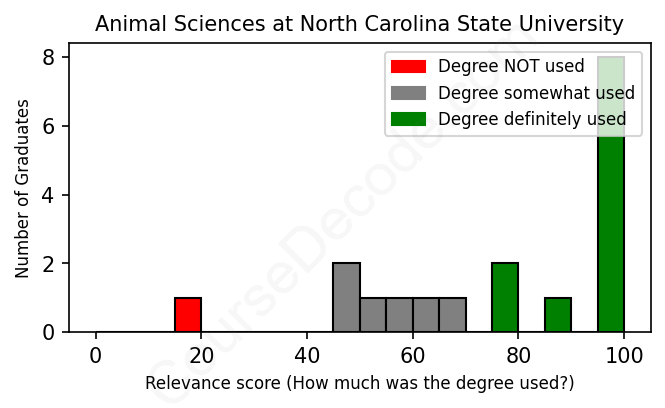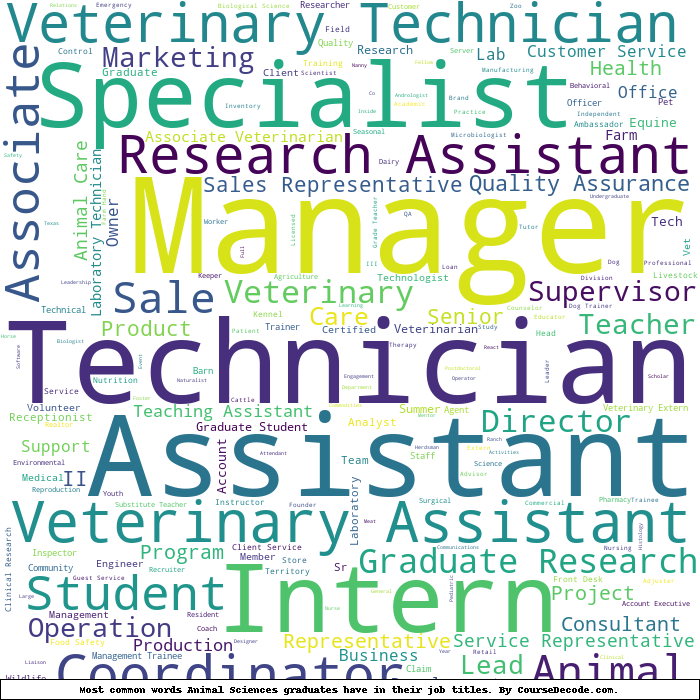
First, some facts. Of the Animal Sciences graduates from North Carolina State University we've analyzed , here's how many have used (or NOT used) their degree in their career:

These are estimates based on AI analysis of 18 LinkedIn profiles (see below).
The verdict? Above average. Overall, with an average relevance score of 77%, Animal Sciences graduates from North Carolina State University have a higher likelihood (+10%) of finding work in this field compared to the average graduate across all fields:
And for comparison, here's the chart for all profiles we've looked at across all degrees.
Also, after graduating, only 33% of these graduates have pursued further education other than another Bachelor's degree (such as a Masters degree or other), compared to the average across all profiles of 35%. This suggests a Bachelors degree is enough for most Animal Sciences graduates, and it's normal to look for work straight after graduation.
See the details:
|
Relevance score: 48% We think this person has gone into a career only somewhat relevant to their degree. We think this person has gone into a career only somewhat relevant to their degree.
DEGREE INFOGraduated in 2021 from North Carolina State University with a Bachelor of Science - BS in Animal Sciences. No other secondary education since. JOB HISTORY SINCE GRADUATIONAfter Care Worker- Sacred Heart Cathedral Diocese of Raleigh Feb 2021 - Jun 2021 Aquarium Intern  Greensboro Science Center Aug 2021 - Nov 2021 Research Technician  UNC Nutrition Research Institute Mar 2022 - Mar 2023 Chemist 1  RTI International Apr 2023 - Present ABOUTNo information provided. |
The top 10 most common jobs done by the graduates we've analyzed (ranked most common to least) are:
When checking out the career paths that graduates with a degree in Animal Sciences from North Carolina State University have taken, you’ll notice a strong trend toward positions that are either directly related to animal care or incorporate aspects of animal behavior and management. A significant number of these grads have landed roles as Veterinary Technicians or Zookeepers, which directly utilize their training in animal handling, care practices, and the biology of various species. Volunteers at wildlife rescues and interns at zoos also frequently pop up, showcasing that hands-on experience in caring for animals is a common pursuit. Fields like veterinary medicine, animal research, and wildlife conservation seem to dominate for those who wish to maintain a close connection to their Animal Sciences education, illustrating a clear relevance to their studies.
However, it's not all animal-related. Some graduates have ventured into positions that aren't directly tied to their degree, like roles in sales or management in non-animal environments. There are a few instances where the jobs are only loosely related, such as pest control or customer service roles, where understanding animal behavior might help but doesn’t really require the specific knowledge gained from their education. Overall, while there’s a notable chunk of graduates who have found paths that are very much in line with animal sciences, others have drifted into areas that don't fully utilize their specialized learning, indicating a mixed relevance in job placements after graduation.
Here is a visual representation of the most common words in job titles for Animal Sciences graduates (this is across all Animal Sciences graduates we've analyzed, not just those who went to North Carolina State University):

Graduates from North Carolina State University with a degree in Animal Sciences tend to have a pretty diverse set of career paths, especially within the first few years after graduation. Many of them kick off their careers in hands-on roles like Veterinary Technicians or Animal Care Assistants. It's not uncommon to see recent grads in internships at zoos or research facilities, where they're able to get valuable experience working with animals directly. This foundational experience often leads them to better, more specialized roles in animal care or research as they gain more experience, like becoming zookeepers or veterinary surgeons. Others may find themselves in related fields like pest control or environmental work, reflecting a broader application of their education in various animal-related settings.
Fast forward about five to ten years, and you can see that many of these graduates are advancing into more senior roles, often still tied to animal sciences, but sometimes expanding into areas like management or research analysis. While some break into research positions or project management roles, others stick closer to the animal care side as Veterinary Technicians or move up into hospital management. However, not everyone ends up in a career directly tied to their major; some former students have branched out into roles that might seem a bit distant from animal sciences, like project management or administrative roles in other industries. Overall, although many graduates do find success in animal-focused careers, there’s a notable variety in job types they explore over the years, highlighting the flexibility of their degree and career experiences.”
Honestly, a Bachelor’s degree in Animal Sciences, whether at North Carolina State University or elsewhere, can be kind of a mixed bag in terms of difficulty. It’s got a reputation for being fairly challenging, especially if you’re diving into courses that cover biology, genetics, and animal physiology—those can get pretty intense! If you're passionate about animals and science, though, you might find it enjoyable and rewarding. There are hands-on learning opportunities too, which can make things more engaging. On the whole, it’s not the easiest degree out there, but if you’re motivated and ready to roll up your sleeves, you’ll make it through just fine!
Most commonly, in the LinkedIn profiles we've looked at, it takes people 4 years to finish a Bachelor degree in Animal Sciences.
Looking at these Animal Sciences grads from North Carolina State University, it seems like they're mostly getting by, but it's a mixed bag when it comes to cash flow. Many started off in entry-level positions, like vet techs and animal care roles, which aren’t usually known for high pay, especially in the early years. Some have made their way up into more specialized roles, like research technicians and management positions, which can definitely boost their earnings. However, jobs like herpetology field techs and pest control technicians likely have pay on the lower end, so it kind of feels like they’re all on a journey to find better-paying gigs. Overall, it looks like they’re gaining experience, but many might not be raking in the big bucks just yet.
Here is a visual representation of the most common words seen in the "about" section of LinkedIn profiles who have a Bachelor degree in Animal Sciences (this is across all Animal Sciences graduates we've analyzed, not just those who went to North Carolina State University). This may or may not be useful:

Here are all colleges offering a Bachelor degree in Animal Sciences (ordered by the average relevance score of their Animal Sciences graduates, best to worst) where we have analyzed at least 10 of their graduates:
| College | Score | Count |
|---|---|---|
 Purdue University Purdue University
|
80 | 14 |
 California State Polytechnic University-Pomona California State Polytechnic University-Pomona
|
78 | 13 |
 North Carolina State University North Carolina State University
|
77 | 18 |
 Iowa State University Iowa State University
|
75 | 25 |
 University of Missouri-Columbia University of Missouri-Columbia
|
75 | 12 |
 South Dakota State University South Dakota State University
|
73 | 10 |
 The Ohio State University The Ohio State University
|
71 | 21 |
 University of Florida University of Florida
|
68 | 15 |
 University of Vermont University of Vermont
|
68 | 12 |
 Michigan State University Michigan State University
|
67 | 20 |
 University of California, Davis University of California, Davis
|
66 | 27 |
 University of Illinois at Urbana-Champaign University of Illinois at Urbana-Champaign
|
63 | 16 |
 University of Tennessee, Knoxville University of Tennessee, Knoxville
|
61 | 13 |
 University of Arkansas University of Arkansas
|
60 | 10 |
 California Polytechnic State University-San Luis Obispo California Polytechnic State University-San Luis Obispo
|
59 | 22 |
 University of Wisconsin-River Falls University of Wisconsin-River Falls
|
58 | 10 |
 Texas A&M University Texas A&M University
|
54 | 34 |
 Penn State University Penn State University
|
53 | 14 |
 Texas Tech University Texas Tech University
|
51 | 12 |
 Kansas State University Kansas State University
|
51 | 22 |
 Oklahoma State University Oklahoma State University
|
43 | 16 |